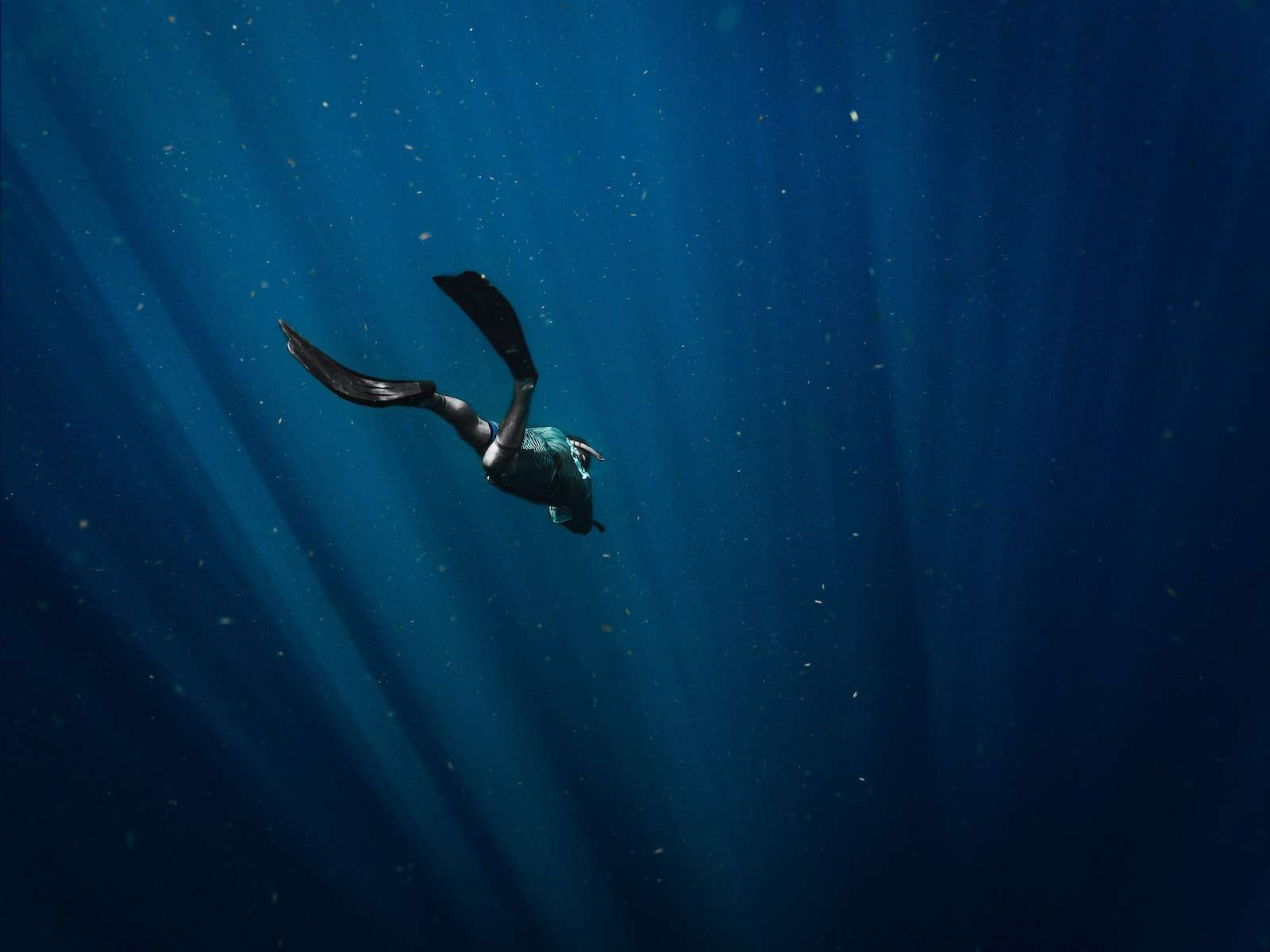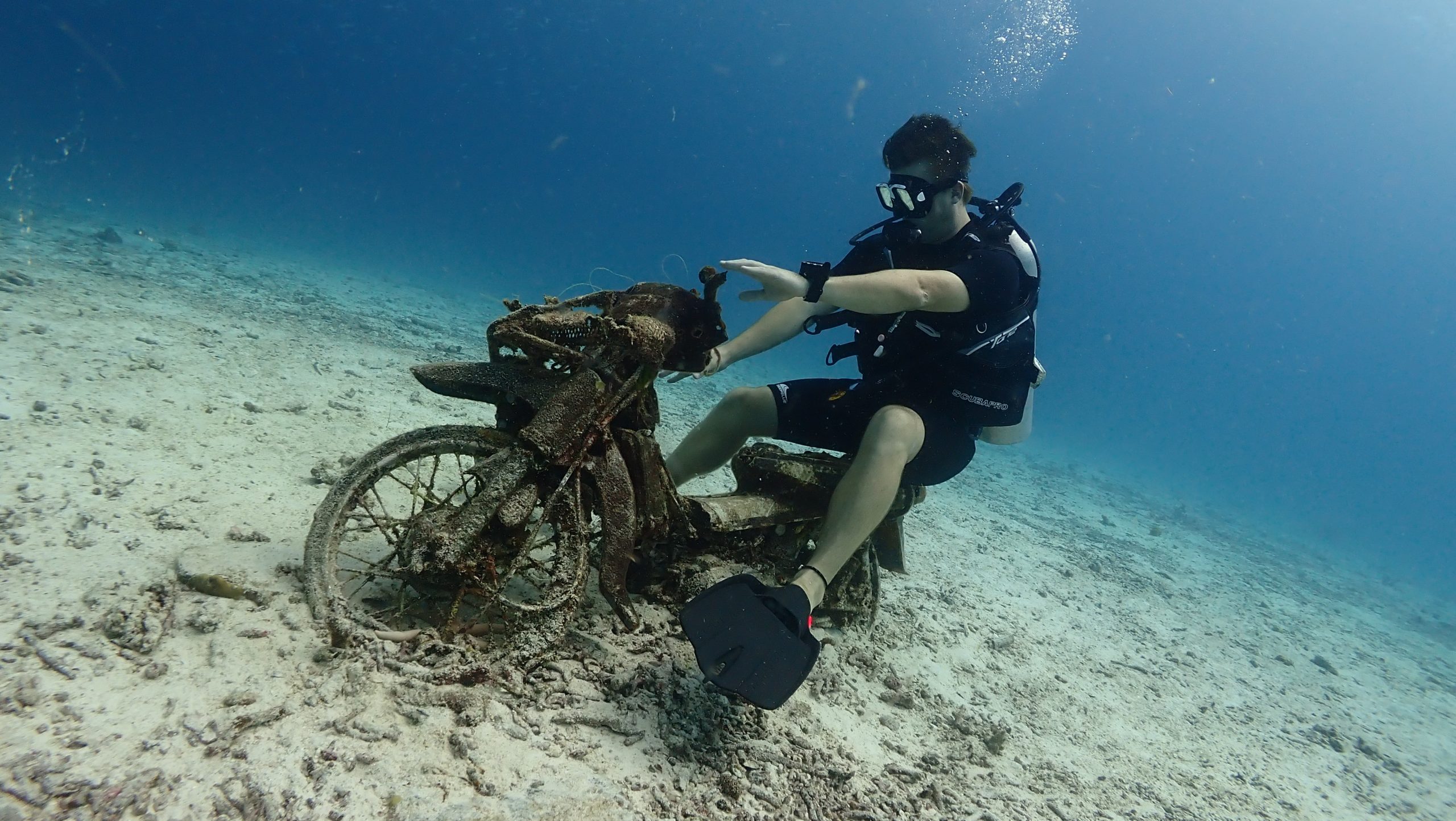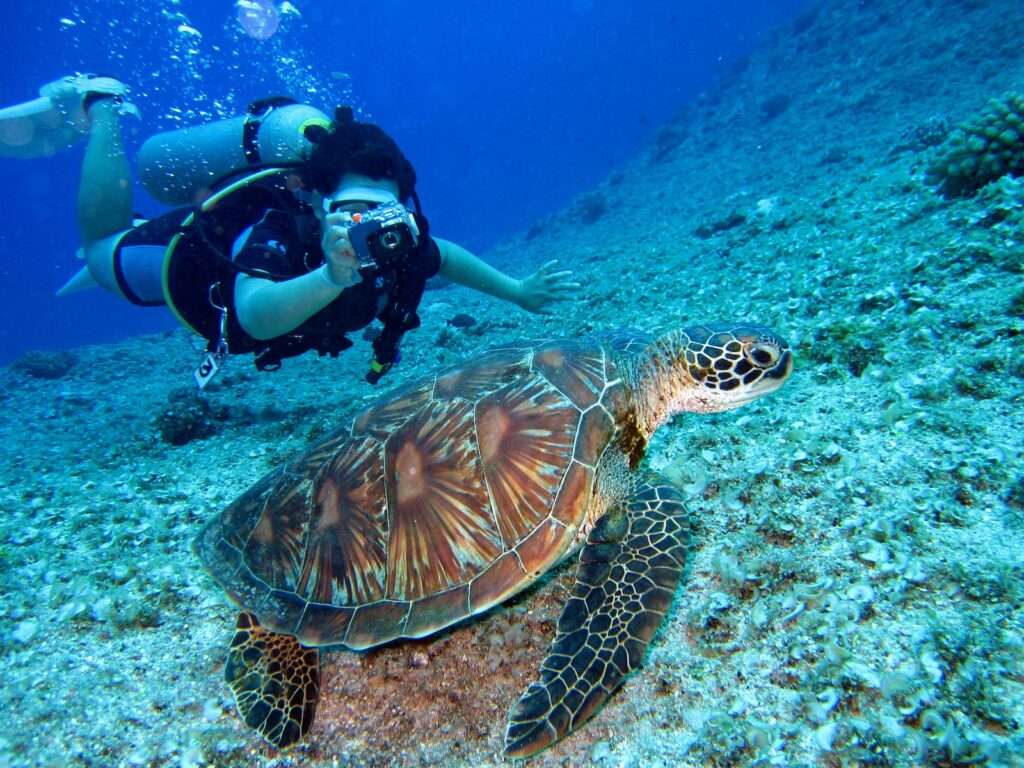A unique adventure that will transform your vision of the underwater world
I still remember my first night dive in Phuket. The nervousness mixed with anticipation as I adjusted my underwater flashlight. The moment when the darkness of the ocean transformed into a universe of colors and movements that simply don’t exist during the day. It’s like entering a completely different world – the same place you might have visited hours before, but now with a magical atmosphere that few have the chance to witness.
Night diving in Phuket is an experience that engages all your senses. The warm waters of Thailand embrace your body as you descend along the guide rope, the moonlight creating dancing patterns on the surface above. It’s a moment of pure connection with the ocean, where each heartbeat seems to synchronize with the gentle movement of the waves.
Today, I want to share with you everything about this incredible adventure – from how to prepare to what to expect when you’re down there, in the night depths of the Andaman Sea.
What Makes Night Diving in Phuket So Special?
The island of Phuket is already famous for its paradise beaches and crystal-clear waters. During the day, thousands of tourists enjoy its sunny coastline. But at night, when most return to their hotels, a select group of adventurers prepares for a different journey.
Night diving in Phuket isn’t just a variation of daytime diving – it’s a completely new experience. Marine life changes drastically: creatures that spend the day hiding come out to hunt, corals open their structures to feed, and fish behavior transforms completely.
Nighttime Marine Life: A Show of Colors and Movement
I can guarantee you’ll be surprised by the transformation of the reef. Fish that you saw sleeping during the day are now in full activity. And most impressive: when you point your flashlight at certain corals, they glow with fluorescent colors that seem straight out of a science fiction movie!
Among the creatures you might encounter:
- Octopuses in full hunting mode, changing color as they move
- Lobsters coming out of their hideouts
- Dancing shrimp with eyes that reflect your light
- Hermit crabs strolling across the sandy bottom
- Barracudas and other predators in action
Once, I was lucky enough to witness an octopus changing color while hunting. It was like watching an artist painting a canvas in real-time, with shades ranging from red to ghostly white in a matter of seconds. Moments like these stay etched in your memory forever.
How to Prepare For Your Night Diving in Phuket
Diving at night requires more preparation than a daytime dive. It’s not more complicated, but it demands attention to some important details.
Training and Certification
First of all, you need to be qualified. Most dive operators require:
- Basic diving certification (Open Water)
- Minimum experience of 10 dives
- Ideally, a specialty in night diving
If you don’t have the specialty yet, don’t worry! Many schools in Phuket offer quick Night Diver courses that can be completed in a day.
Essential Equipment
Equipment for night diving includes some additional items:
- A powerful and reliable primary flashlight
- A backup flashlight (never, ever dive at night without a spare!)
- Light sticks for identification
- An underwater horn or other signaling device
When I chose my first flashlight for night diving, I opted for a model with rechargeable battery and adjustable beam. It was an investment worth every penny, as good lighting makes all the difference in the experience.
Mental State: The Importance of Calm
Being honest: the first few times, diving in the dark can cause some discomfort. It’s natural. The nighttime ocean stimulates our imagination in ways that can generate anxiety.
My advice is: breathe deeply, trust your training, and remember that the nighttime sea is generally calmer and more predictable. Focus on the beauty around you, not on unfounded fears.
The Best Spots For Night Diving in Phuket
Phuket offers several excellent spots for night diving, each with its unique characteristics.
Shark Point
Don’t be fooled by the name! Although it’s possible to see reef sharks during the day, at night this spot reveals an abundance of impressive macro life:
- Ornamental shrimp
- Decorator crabs
- Colorful nudibranchs
- Hunting moray eels
I dove at Shark Point during a full moon night, and the visibility was so good that we could see the outline of the reef even with our flashlights turned off. A magical moment was when all divers turned off their lights for a minute, allowing us to observe the natural bioluminescence of the waters.
Racha Yai Island
Popular for daytime dives, Racha Yai transforms completely at night:
- Shallow reefs, perfect for less experienced divers
- Large groups of sleeping squirrelfish
- Generally calm waters
- Excellent visibility
A unique experience at Racha Yai is observing sleeping parrotfish. They secrete a kind of mucus cocoon to protect themselves during the night, something you would never see during the day.
Patong Bay
For those who want convenience, Patong Bay offers night dives just a few minutes by boat from the beach:
- Easy access
- Artificial reefs with abundant marine life
- Moderate depth (12-18 meters)
- Opportunity to see seahorses and octopuses
What to Expect During Your First Night Diving in Phuket
Your first night dive will be unforgettable. Let’s analyze how it usually happens:
Briefing and Preparation
You’ll arrive at the boat during sunset. The instructor will give a detailed briefing, covering:
- Flashlight communication signals
- Emergency procedures
- Information about the dive site
- Expected behavior of marine life
Once, my instructor taught us an interesting trick: placing the flashlight under your chin when finding something interesting. This technique illuminates your face, making it easier for others to identify who is signaling.
Entering the Water
Entry usually occurs during twilight, when there’s still a bit of natural light. This makes adaptation easier. You’ll immediately feel the difference in water temperature – at night, it seems warmer and more welcoming.
The Underwater Experience
As you descend along the anchor rope, you’ll notice how your senses adjust. Vision is limited to the cone of light from your flashlight, but in compensation, your hearing seems sharper. You can clearly hear the sound of your breathing, the clicking of shrimp, and other underwater sounds that would go unnoticed during the day.
One of the most remarkable moments for me was when, during a night dive near Koh Doc Mai, I had the chance to witness a phenomenon known as “spawning” – when corals release their gametes in a kind of synchronized dance. It was like it was snowing from bottom to top, with millions of tiny luminous particles floating toward the surface.
The Return
After about 40-45 minutes (night dives tend to be shorter), you’ll begin your return. The ascent at night has something magical – the lights from the boat and the coast shine on the surface like inverted stars.
Back on the boat, the adrenaline from the experience usually keeps everyone excited, sharing discoveries and special moments from the dive.
Practical Tips To Make the Most of Your Night Diving in Phuket
Based on my experiences, here are some tips that will make a difference:
Choose the Right Time
The best season for night dives in Phuket is from November to April, when:
- Waters are calmer
- Visibility is better
- There’s less chance of storms
January and February offer the most predictable conditions for night dives.
Take Care of Your Camera
If you plan to take photos during the dive, remember:
- Use a wide-focus flashlight for illumination
- Adjust the camera’s white balance
- Keep your distance to avoid frightening creatures
- Avoid using flash directly in animals’ eyes
My first attempt at nighttime underwater photography was a disaster – I forgot to check the camera settings and ended up with 100 completely dark photos! I learned that testing everything on the surface saves a lot of frustration down below.
Control Your Buoyancy
At night, it’s even more important to have precise control of your buoyancy:
- Avoid touching the bottom, where many nocturnal creatures live
- Keep distance from corals, which are feeding
- Move slowly to preserve air and energy
Enjoy the “Light Show”
A common ritual in night dives is the “light show”: all divers turn off their flashlights for a brief moment to observe:
- Bioluminescent organisms
- The effect of moonlight filtering through the water
- The unique sensation of floating in darkness
This is always my favorite moment of the dive. In tropical waters like those of Phuket, turning off your flashlight can reveal small points of bluish light – bioluminescent plankton that shines when disturbed by your movement.
Cultural Aspects and Sustainability
Respect for Local Culture
Thailand has a deep and spiritual relationship with the ocean. Showing respect for local culture includes:
- Participating in possible rituals or blessings before diving
- Listening to local stories about the sea and its inhabitants
- Learning some basic words in Thai
On one occasion, our Thai guide made a small offering to the sea before diving, explaining that it was a way to show gratitude and ask for protection. This type of cultural connection greatly enriches the experience.
Sustainable Diving
Phuket’s marine ecosystem faces challenges, and as divers, we have a responsibility to:
- Never touch or collect marine organisms
- Be extremely careful with buoyancy control to avoid damaging corals
- Participate in underwater cleanup initiatives when possible
- Choose dive operators committed to sustainable practices
Overcoming Fears and Challenges
Let’s be honest: diving at night can seem scary at first. Here are some common concerns and how to deal with them:
“What if I get lost?”
This is a natural concern. In practice:
- You always dive with a buddy and a guide
- Sites are carefully chosen to minimize currents
- Specific nighttime navigation techniques are taught before the dive
- Light sticks help identify your group
“I’m afraid of sharks at night!”
Sharks in Phuket are generally shy and non-aggressive. In fact:
- Encounters with sharks during night dives are rare and considered privileges
- Local species (mainly reef sharks) pose no danger
- Statistically, diving is safer than many everyday activities
Once, during a briefing, our instructor asked: “Who’s afraid of sharks?” Almost everyone raised their hand. Then he asked: “Who has seen a shark in Phuket?” Only two in a group of twelve. Nature rarely corresponds to our fears.
“What if my flashlight fails?”
This is a valid concern with a simple solution:
- You always carry a backup flashlight
- Your buddy has two flashlights too
- The guide carries extra flashlights
- You learn signals to communicate equipment problems
The Impact of A Night Diving in Phuket
Diving at night is not just an activity – it’s a transformative experience. Many divers report that after their first night dive, they never see the ocean the same way again.
Deeper Connection with the Ocean
There’s something deeply intimate about witnessing marine life when few humans are present. You become a privileged observer of a world that most will never see, creating a deeper connection with the marine environment.
When I witnessed the night hunting of a moray eel working in partnership with a needlefish, I understood that the ocean is much more complex and fascinating than we can imagine. It’s like watching a real-life documentary, but as a participant, not just a spectator.
Personal Development
Overcoming the mental challenge of night diving brings benefits that go beyond the activity itself:
- Increased confidence
- Greater ability to manage stress
- Appreciation of beauty in unexpected situations
- A renewed perspective on what is possible
Planning Your Night Diving in Phuket
If you’re convinced that night diving in Phuket should be on your list of experiences, here is practical information for planning:
Best Time to Visit
As I mentioned before, November to April offers the best conditions, with January and February being ideal. During the monsoon season (May to October), many operators reduce or suspend night dives due to less predictable weather conditions.
Recommended Operators
While I can’t recommend specific businesses, look for operators that:
- Have a good reputation on review sites
- Offer small groups (maximum 4 divers per guide)
- Include detailed briefings
- Prioritize safety with quality equipment
- Demonstrate commitment to sustainable practices
Costs and Logistics
A night dive in Phuket generally costs between 3,500-4,500 THB (approximately $100-130 USD), including:
- Complete equipment
- Specialized guide
- Transportation to/from hotel
- Light snack or dinner
- Light sticks and other specific tools
It’s recommended to book a few days in advance, especially during high season.
Integrating Night Diving in Phuket Into Your Trip Itinerary
A night dive fits perfectly into a Phuket vacation itinerary. Here’s how you can organize it:
Before the Dive
- Avoid flights in the 24 hours before
- Stay hydrated
- Avoid alcoholic beverages the night before
- Have a light meal a few hours before
After the Dive
- Reserve some time to share stories with other divers
- Avoid flights in the 18-24 hours following (depending on depth)
- Consider a relaxing Thai massage to recover your muscles
Combining with Other Experiences
Night diving combines well with:
- Daytime dives at different locations
- Visits to nearby islands (Phi Phi, Similan)
- Cultural exploration of temples and markets
- Local gastronomy such as delicious Tom Yum Goong
Final Reflections On Night Diving in Phuket
Each time I enter the water for a night dive in Phuket, I feel that same combination of excitement and reverence as the first time. It’s as if the ocean is inviting me to an exclusive spectacle, where I am one of the few privileged spectators.
The experience transcends common diving. It’s an exercise in presence, in connecting with something greater, in witnessing nature in its most authentic form and least disturbed by human presence.
When you emerge from the water after night diving in Phuket, you carry with you not only memories of fascinating creatures and unique behaviors but also a transformed perception of the ocean. The waters that during the day seem merely a playground for tourists reveal their true nature: a complex and pulsating ecosystem, full of life and mysteries that continue to unfold when the sun sets.
If you’re contemplating this experience, my sincere advice is: go. Overcome the initial fear, prepare yourself adequately, and allow yourself to witness this less-known face of the Andaman Sea. Phuket’s nighttime ocean has stories to tell that can only be heard by those willing to dive into the darkness.
Key Points
- Night diving in Phuket offers a completely different perspective of marine life compared to daytime dives
- The best season is from November to April, with January and February offering ideal conditions
- Proper equipment and mental preparation are essential for a safe and enjoyable experience
- Locations such as Shark Point, Racha Yai, and Patong Bay offer unique nighttime experiences
- Nighttime marine life includes unique behaviors such as octopus hunting, feeding corals, and bioluminescence phenomena
- Night diving can transform your perception of the ocean and create a deeper connection with the marine environment
- Sustainable practices and respect for local culture enrich the experience
- Basic diving certification and some experience are prerequisites, with specialty in night diving being recommended
- The average cost ranges between 3,500-4,500 THB (approximately $100-130 USD) per dive, including equipment and guide








